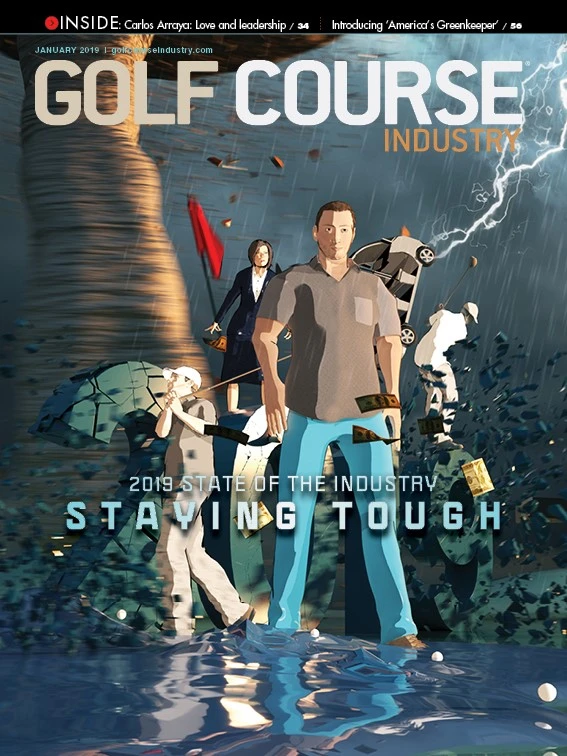
In the early years of golf course management, it was common that young, aspiring assistant golf course superintendents apprenticed under veteran and more established superintendents. It was also common that superintendents in the same area gathered together to play golf or attend education, or to have lunch and talk about greenkeeping, weather forecasts, and how to solve the issues of the day.
Even now, in the Google era, it is still an important part of our profession to learn from and edify each other. Here are five important things I have learned from other superintendents over the years that have helped me find sustained success in the golf course management industry.
Do the job, and then some
This is advice I will never forget. You see when we are at our best as superintendents, we aspire to exceed expectations, so when we deliver clean, beautiful and challenging golf course experiences at or below budget projections, we stand out having achieved our highest calling. It is like sports turf legend George Toma said to me many years ago as I interviewed him for a green industry profile, “Do the job, AND THEN SOME. It distinguishes the mediocre from the great!” Great advice from a great man. This advice applies to every part of the golf/turf operation or life for that matter.
Every detail is important, and every staff member has a role to play. It is our job as the superintendent to be the conductor of this complex orchestra of excellence and ensure that we exceed the expectations of stakeholders (owners, management, guests, members, peers and staff). The tasks are many and they range from agronomic programs to xeriscapes, but when you have a great golf experience, it transcends mere physical assets and the feelings and memories are directly related to those of the superintendent and their team. To be a successful superintendent, you must embrace all the responsibilities and learn a lesson from the legends and do the job enthusiastically – AND THEN SOME.
You cannot do everything yourself
There comes a time in every superintendent’s career they realize you cannot do everything yourself. In my case, I learned this lesson early in my career (thankfully) and it came courtesy of a much wiser superintendent, Frank Siple, CGCS, retired. Frank was a veteran superintendent in our area and he opened my eyes to the potential of delegation and training, and how the two are infinitely connected.
At first, I thought I could work 100 hours a week and be physically involved in every part of our operation every day, including weekends and holidays. Through Frank’s example and advice, I realized that if I hire good people, train them properly and delegate effectively, I could simply inspect what I expected and confirm a strong set of standard operating procedures. This put me in the critical areas more often, and the operation and I became exponentially more successful. The change in philosophy and application made for happier golfers and happier staff, giving me a much better work/life balance.
The successful superintendent realizes they cannot do everything themselves and manages their resources accordingly. Thanks Frank for telling me this truth over and over until I finally heard you!
Never stop learning and teaching
I have experienced 30-plus years as a successful superintendent and I am fond of reminding my team that we should learn, do, teach and repeat. But legendary golf course superintendent Bruce Williams, CGCS, introduced me to the need for lifelong learning via formal and informal classes, certifications, reading/writing articles and books, webinars, and regional and national conferences, and the role that teaching plays in the process.
A past president (1996) of the GCSAA, Bruce taught one of the first big-time educational seminars that I attended as a rookie superintendent. He was articulate, well-informed and passionate about the need for superintendents to commit to lifelong learning. He said, “to truly demonstrate mastery of a subject, you should be able to pass on the subject lessons and skills to others.” I embraced the idea and for many years I have been both a student and teacher (GCSAA faculty member) at the Golf Industry Show and GCSAA Education Conference.
Being skilled at a craft is one thing, being so immersed as to teach those skills to others is a higher level of mastery. Think about how much better your legacy as a superintendent will be when you have excelled as both a student and a teacher.
Make decisions like you will be employed at that property forever
The Iroquois have a saying: “The impact of every decision should be thought through to the seventh generation.” That is roughly 200 years. This is to ensure that even beyond our personal involvement, we should make good decisions that will benefit others and the property in perpetuity.
My enlightenment to this truth in golf course management was due to my relationship with Dr. Eddie Seagle and Palmer Maples Jr., CGCS, retired (GCSAA president 1975). Our connection is Abraham Baldwin Agricultural College in Tifton, Ga. Dr. Seagle was the longtime professor of ABAC’s golf turf and environmental horticulture program and Palmer was (by personal invitation of Dr. Glen Burton) part of the first ABAC turf graduation class of 1953. I was part of the ABAC class of 1984.
These men taught me to have strong character, not to take shortcuts and above all make the best decisions possible for the property not just for the day but for the future as well. I have been surprised at how in the last 33 years the 99-year philosophy has been received by the ownership of the clubs I have served and the industry. I have been rewarded many times for taking the higher road and seeing a bigger picture to solve problems rather than cover them up. These actions lead to a shared legacy between a superintendent and their property.
There is no substitute for being committed long-term to a cause or property, and even though we know that sometimes tenures are much shorter in total years, the level of thought engaged to make property decisions should remain connected to a higher, deeper purpose. The goal of every superintendent is to be successful during their tenure and establish such a cornerstone of excellence that their successors will speak positively of the work and decisions they made years after they have moved on.
Serve the industry, and then serve others
The 80/20 rule states that 80 percent of all the work within an organization is completed by 20 percent of the membership – the most committed ones. The best and most innovative superintendents have embraced this call to serve.
This piece of advice came to me over and over in my career and from successful names in the golf course management industry. Superintendents such as Darren Davis (current GCSAA president), Rafael Barajas (GCSAA vice president), Randy Nichols (GCSAA president, 1993), Ken Mangum, Buck Workman, Mike Crawford, Charlie and Chuck Underwood, David Phipps, Kevin Breen, Johnny Walker (my Texas and FFA brother), Keith Ihms (GCSAA president, 2014), Brian Cloud, Jorge Croda, Mike Epps, Kirt Phillips, and the list goes on and on.
All encouraged me to join them and serve our industry. It has become clear to me that to protect our traditions and to continue to be innovative, we need superintendents who are willing to volunteer to host events, serve on committees or board of directors, donate time/money/resources, and organize these essential efforts for our greater good. I have been blessed to serve in many ways in Georgia, Texas and across the country for the GCSAA. It makes a difference.
Inspired by other superintendents, I have also donated my time and talents to a variety of other causes that have impacted our community.
It is becoming harder and harder to find people who are willing to serve. Now more than ever, we need to raise our shared vision and our level of service to include things like advocacy, research and scholarships.
I was not the first to serve, and I will not be the last, but I aspire to be a bridge connecting those who laid the foundations of our industry to those who will add the next story. We owe a debt to each superintendent who has served and encouraged others to serve.
If I have found any measure of success in the golf course management industry, it is due in large part to the advice and support I have received from other superintendents. Their skills and character have left an incredible mark on our industry and on me.

Explore the January 2019 Issue
Check out more from this issue and find your next story to read.
Latest from Golf Course Industry
- SePRO to host webinar on plant growth regulators
- Turfco introduces riding applicator
- From the publisher’s pen: The golf guilt trip
- Bob Farren lands Carolinas GCSA highest honor
- Architect Brian Curley breaks ground on new First Tee venue
- Turfco unveils new fairway topdresser and material handler
- Ignite Attachments adds new box plane and grapple
- Mackenzie & Ebert working on new Caribbean course






